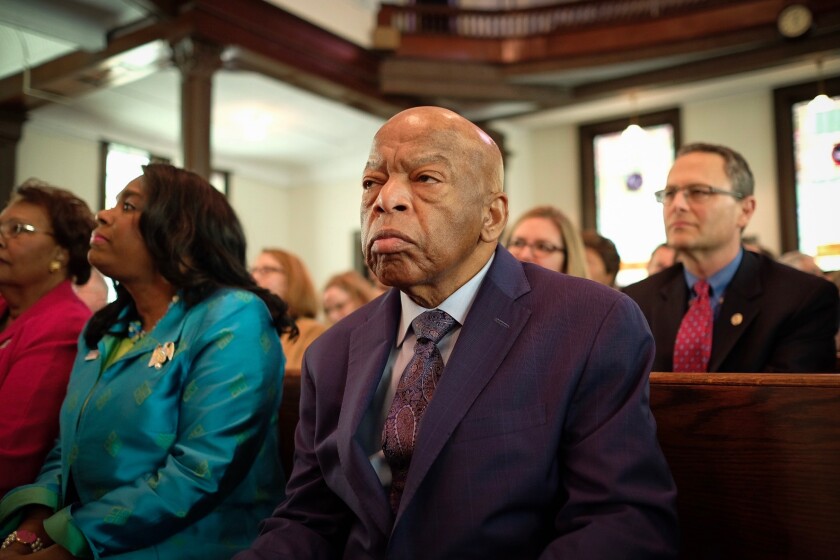How Congressman John Lewis wound up in ‘Arthur’ on PBS Kids
Rep. John Lewis died last 7 days from pancreatic cancer at the age of 80, inspiring heartfelt tributes from politicians, activists and every day citizens whose lives were altered by his decades of work on behalf of civil legal rights.
Lewis, whose lifestyle will be celebrated beginning Saturday early morning at Alabama’s Troy University, famously led the “Bloody Sunday” march in Selma, Ala., in 1965, where by he was overwhelmed by state troopers as lately as last thirty day period, he appeared at Black Life Matter Plaza in Washington, D.C., to assistance growing racial justice protests across the state. But the longtime congressman also was savvy when it arrived to conveying his concept of social modify by pop society.
He released two autobiographical graphic novels, “March” and “Run” gamely cosplayed at Comic-Con as a young model of himself was a frequent guest on late-night time Tv set — at the time group-browsing on “The Late Clearly show With Stephen Colbert” — and participated in a documentary, “John Lewis: Great Difficulty,” introduced before this thirty day period.
And as I found out lately many thanks to my five-year-old daughter, an avid shopper of PBS programming, Lewis also guest-starred in the prolonged-jogging animated sequence “Arthur.” As incongruous as it was for me to see a person of the most revered civil legal rights leaders in American history depicted as a cartoon bear, the episode taught my daughter that Lewis was “a particular person,” as she recalled to me this 7 days.
In “Arthur Can take a Stand,” which to start with aired in 2018, Arthur, an 8-year-old anthropomorphic aardvark living in the fictional Elwood City, learns that Lewis will be a guest speaker at his university, Lakewood Elementary. His close friend, Sue Ellen, a precociously sensible crimson-headed cat, clarifies why this is so fascinating: “He was a definitely important civil legal rights chief in the sixties and challenged the lack of equivalent legal rights for Black Americans!”
But Arthur is upset to study that his close friend, lunch woman Mrs. MacGrady, has been doing the job further hrs to make breakfast for the students at Lakewood. Arthur pleads with Skip Tingley, the principal, to use an assistant but she brushes him off.
Upset, Arthur dozes off in the library and has a nightmare about Mrs. MacGrady’s workload — then awakens to uncover the civil legal rights chief sitting down next to him. Lewis encourages him to preserve combating for his close friend. “Sometimes men and women really don’t hear the to start with time. You have to be persistent. But if this implies a ton to you, do not give up. Keep your ground. A human being with conviction can modify the globe.”
Arthur decides to arrange a cafeteria sit-in to force the university to use an assistant for Mrs. MacGrady, and Lewis joins in the demonstration in a twist, it turns out Mrs. MacGrady is an old close friend of the Ga congressman, as each attended the 1963 March on Washington. Skip Tingley relents below pressure and agrees to press for much more funding.

John Lewis in the documentary “John Lewis: Great Difficulty.”
(Ben Arnon / Magnolia Pictures)
“There’s practically nothing much more important than following your conscience,” Lewis tells Arthur at the finish of the episode. “If you can do that, you’re constantly going to rest nicely.”
The thought for “Arthur Can take a Stand” dates back to 2017, when Marc Brown, the writer of the “Arthur” reserve sequence and creator of the Tv set present, satisfied Lewis at the Nationwide Press Club’s Reserve Fair and Author’s Night. It was his thought to invite Lewis to show up on “Arthur,” which about 23 seasons has routinely tackled social troubles, from bullying to local weather modify. (Very last year, Arthur’s trainer Mr. Ratburn arrived out and received married to a person, ensuing in a small society-war skirmish when an Alabama public Tv set station refused to broadcast the episode.)
“It definitely is in line with all that we’ve accomplished constantly on ‘Arthur,’ which is to bring in assorted viewpoints and exciting guest stars and think about topics that a ton of other kids’ sequence may not,” claimed Carol Greenwald, govt producer of “Arthur” and director of children’s media at WGBH, the Boston-centered public tv station that provides the sequence.
“We desired to check out how a youthful kid can protest, which is not about receiving a petition signed and producing a letter to your congressperson. That is all good stuff but not automatically good Tv set,” claimed writer Peter Hirsch. “We believed it would be good for Arthur to recognize an injustice that wasn’t automatically taking place to him and to come to feel strongly enough to want to do one thing about it. So it was form of hitting two points: a person, how to protest, and two, empathy.”
“Of class, we experienced to go back and forth with, how significantly is our character going to get into ‘good trouble’?” Hirsch ongoing, alluding to Lewis’ have words and phrases about civil disobedience. “I think that was the challenge of the episode. We desired it to have a tiny bit of chunk but not be so out there that the young children were placing them selves in jeopardy.”
Lewis was excited about the opportunity to show up on the present, claimed Greenwald. “He was definitely dedicated to receiving his concept out to where ever it could go. And in that context he realized it was important to be speaking to young children about this stuff.”
But he did have some notes, telling Hirsch in blunt phrases when he received the history wrong and weighing in on his character’s design and style. Producers originally presented him with a couple of solutions. Lewis turned down a person in which he was depicted as “a definitely cuddly teddy bear,” Greenwald claimed. “He claimed, ‘I just really don’t look like that.’” (They opted for a rather a lot less cuddly bear.)

In this June 7, 2020, picture, John Lewis seems to be about a portion of 16th Street renamed Black Life Matter Plaza in Washington, D.C.
(Involved Press)
The third-act expose about Mrs. MacGrady’s earlier as an activist just felt correct for the secretly groovy character, suggests Hirsch. “We experienced constantly envisioned her as a little one of the ’60s. She’s a ton hipper than you would know except you talked to her. So we believed, “This is in fact the perfect human being to be on civil legal rights marches.”
Greenwald attended Lewis’ voice recording periods, which were, she recalled, “more demanding than he expected, which of class it constantly is. But I was definitely struck by his warmth and his openness and also just his willingness to bounce in and have some enjoyment. One of the privileges of this work has been to do these points, and this was the very best a person, because he’s clearly a hero.”
As racial justice protests spread across the state following the killing of George Floyd, PBS decided to make the episode accessible yet again by way of the PBS Young children application.
“We received a ton of definitely constructive responses” to “Arthur Can take a Stand,” claimed Greenwald, including that next thirty day period, WGBH programs to launch a particular short episode of “Arthur” that will frankly go over race and violence and will consist of a tribute to Lewis.
“We also received responses from men and women stating we should not be displaying young children stuff like this: ‘You ought to protect young children from this.’ Our sensation was possibly some young children can be secured from these troubles, but not all young children, and we want all young children to fully grasp what these troubles imply to different communities. That is aspect of what our aim with ‘Arthur’ is, to be sharing these experiences broadly so young children of all varieties can fully grasp and establish empathy.”
